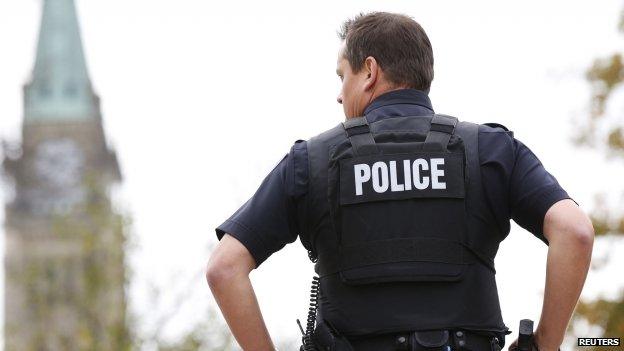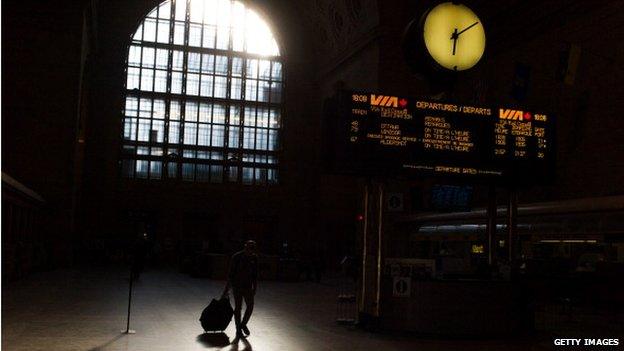Viewpoint: Canada's growing extremism
- Published

The world's attention is now focused on recent violent attacks in Canada. Canadian terrorism expert Tom Quiggin explains how the country is facing a growing problem with extremism.
The sergeant-at-arms of the Canadian Parliament, Kevin Vickers, shot dead an assailant who was intent on killing members of parliament in the Centre Block on Parliament Hill.
Minutes earlier, a Canadian Forces soldier was killed at the National War Memorial.
The attacks hit at the heart of Canada's symbols of public life.
Canada has now suffered two terrorist attacks in two days.
The first attack on 21 October resulted in the death of one Canadian soldier and the injury of another.
The assailant's social media postings show he was clearly inspired by Islamic State (IS) propaganda.
The timing of the second attack, combined with witness reports, suggest a similar influence, although no claims of responsibility have emerged.
Promoting violence
Many in Canada are now asking: is this a case of "one-off" violence inspired by IS, or does a larger problem exist?
While they are in the minority, Canada is home to a number of extremists who preach radical views.
They have been creating a political space where promoting violence both at home and overseas is becoming acceptable.
Previously, extremist voices such as the Egyptian Canadian Ahmed Said Khadr, who was suspected of links with al-Qaeda, counselled that violent jihad overseas was required, but that violence in Canada was to be avoided.
This has now changed.
Over the past years, a number of young Canadians have departed to be suicide bombers, IS fighters and terrorist attackers.
Last week, the Royal Canadian Mounted Police stated that they had 63 national security cases linked to terrorism involving 90 suspects. Those include people who intend to go overseas to fight and those who have returned.
Canada, much like the UK and other European countries, has allowed a steady stream of extremist individuals, money and ideology to enter the country.
Since the 1980s, these individuals have set up front groups and charitable organisations to accomplish their goals.
Over the past few years, four of these charities have had their status revoked for funding terrorism. These include the World Islamic Call Society of London, Ontario, in 2011, which was involved with Col Muammar Gaddafi's Libyan Jihad Fund.

Extremism in Canada
Canadian Momin Khawaja involved in al-Qaeda-inspired plot to strike British targets with fertiliser bombs in 2004; jailed in 2009 in the first conviction under 2008 anti-terror law
So-called "Toronto 18" planned in 2006 to detonate truck bombs around Toronto and take hostages including the prime minister in al-Qaeda-inspired plot; 11 convicted
Hiva Alizadeh jailed in September 2014 for attempting to organise a militant jihadist cell in Ottawa
Tunisian Chiheb Esseghaier and Palestinian Raed Jaser charged in 2013 over a plot to derail a Toronto-New York train, with alleged support from an Iran-based al-Qaeda cell; both awaiting trial

Spreading extremist ideology
From these centres of extremism, a conveyor belt system exists for radicalisation that exploits vulnerable youth who respond to the messages of al-Qaeda, Hamas, IS and others.
Examples of this were Xristos Katsiroubas, 22, and Ali Medlej, 24, both from Ontario, who were key figures in the gas plant attack in Algeria in January 2013.
Canada is now faced with the question of how it should respond to the spread of extremist ideologies.
The first line of attack could be to remove charitable status from the front groups.

A passenger walks through Union Station in Toronto in April after police arrested two people connected to an alleged al-Qaeda plot to detonate a bomb on a Canadian train
To date, a limited amount of progress on this issue has been made in Canada.
For example, the International Relief Fund for the Afflicted and Needy-Canada was listed as a terrorist entity in April after it was accused of channelling money to Hamas.
The Ontario-based Islamic Society of North America Development Foundation had its charitable status revoked after the Canada Revenue Agency accused it of distributing funds to a group linked to another group listed as a terrorist organisation by the EU and the government of India.
However, more than 20 charities in Canada remain that are believed to be fronts for extremism.
The UK recently launched a study into the Muslim Brotherhood to better understand the nature of the group.
At this point, Canada needs to have a similar national-level inquiry into both violent and non-violent extremists who are developing values which run contrary to the constitution and the Charter of Rights.
Tom Quiggin is a member of TSEC - the Terrorism and Security Experts Canada network.